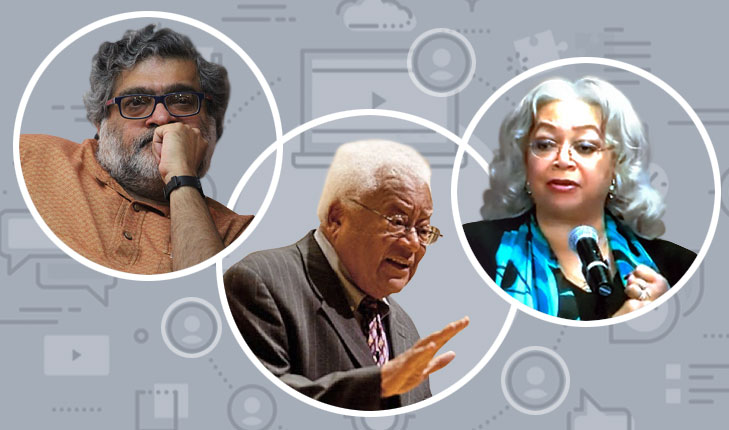Fresno State will present three renowned civil rights scholars as panelists for “Gandhi, the Civil Rights Movement and the Continuing Struggle for Justice and Peace,” a webinar hosted by the Office of the President — the Rev. James M. Lawson Jr., Vinay Lal and Dianne Dillon-Ridgley.
This event will focus on the history of connections between Mohandas Gandhi and leaders of civil rights movements, as well as the continuing struggle against racial inequality and injustice.
The hour-long webinar will be broadcast on Zoom from 10 to 11 a.m. Wednesday, Sept. 2. Following brief presentations from each of the three scholars, a moderated question-and-answer session will take place.
- The Rev. James M. Lawson Jr. is widely recognized as a pioneer of nonviolence in the American Civil Liberties Movement. He is an activist, minister, and a scholar of the Bible, as well as a living icon embodying the power of nonviolence in securing justice and peace. Dr. Martin Luther King, Jr. described Lawson as “the leading theorist and strategist of nonviolence in the world.”
- Vinay Lal, a professor of history and Asian American studies at UCLA, has written over a dozen books on a broad range of intellectual, political and research interests, which include South Asian history, comparative colonial histories, the Indian diaspora, public and popular culture in India, cinema, cultures of sexuality, the global histories of nonviolence and the thought of Mahatma Gandhi.
- Dianne Dillon-Ridgley, a member of the board of trustees of the Parliament of the World’s Religions, is a lifelong advocate for human rights, female empowerment and sustainability. She is currently the executive director of the Women’s Network for a Sustainable Future. Originally from Dallas, Dillon-Ridgley has advised and served on over 23 U.S. delegations at the United Nations and international forums spanning the tenure of three U.S. presidents.
“The webinar is an example of what Fresno State does best: We dialogue, we discuss, and we provide informed scholarship for the sake of building bridges of collaboration and furthering our understanding of history,” said Dr. Saúl Jiménez-Sandoval, provost and vice president for Academic Affairs at Fresno State. “This seminar will highlight how Gandhi’s philosophy influenced the historic movements led by Dr. Martin Luther King, Jr., the Reverend James M. Lawson, John Lewis, and others. Some lessons will include the value of building alliances, the importance of nonviolent action, and the power of collective dedication to promoting change that furthers social equality and harmony.”
Those interested in participating can join the Sept. 2 webinar at this link: https://fresnostate.zoom.us/j/91934360413?pwd=NDM4dUxLbEFZYmgxMFh6NDFSVkU3UT09
Fresno State is planning another discussion for a later date, around the topic “Gandhi’s Vision of India and the Struggle for Unity and Harmony.”
“As the national conversation on issues of race, violence and inequality continues, Fresno State plays a critical role in examining history and the individuals who made lasting contributions to a just and fair society,” said President Joseph I. Castro. “Gandhi and the other individuals represented in our campus Peace Garden are honored for embodying the spirit of peaceful and constructive activism — for their intellectual and values-driven growth, not absolute purity — that ultimately led to inspired leadership and progress in the pursuit of equality, social change and justice.”
Over the summer, an online petition called for the removal of the Gandhi statue in Fresno State’s Peace Garden, saying that Gandhi’s beliefs and actions during his life were racist and misogynistic, and accusing him of sexual misconduct. The petition has more than 6,100 signatures.
Veena Howard, philosophy professor and Gandhi scholar who has organized this webinar, wrote an op-ed for The Fresno Bee, explaining why the Peace Garden statue cannot be compared to a confederate monument:
“These moments of reckoning provide us with an important opportunity to educate ourselves about the history and possibilities of self-transformation. … Gandhi said, ‘My life is my message.’ When we review his works in their totality, we see an individual who transformed himself out of his colonial upbringing. Isn’t this the call for our current time?”
Castro also addressed the statue controversy with a statement on June 24. Since then, University officials have made clear that the Gandhi statue will remain in Fresno State’s Peace Garden. The Peace Garden was established 30 years ago through the support from students, faculty, staff, alumni and community. That same group supported the placement of the Gandhi statue in the Peace Garden.





